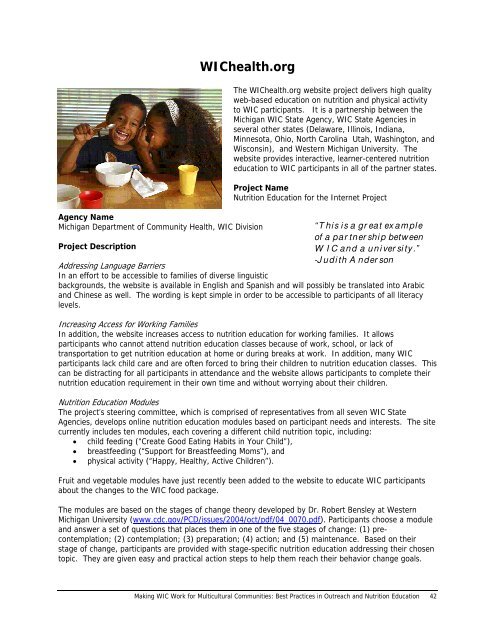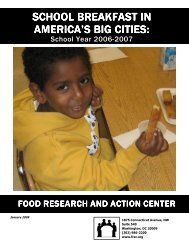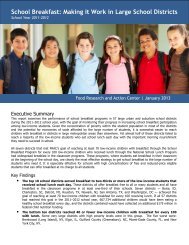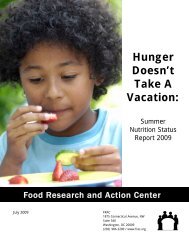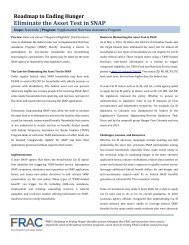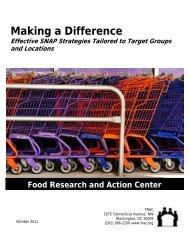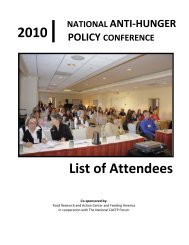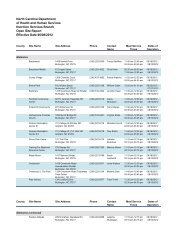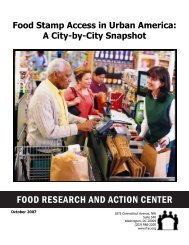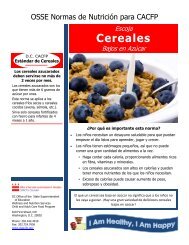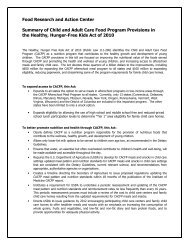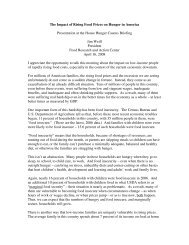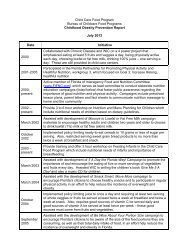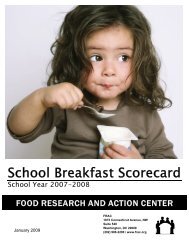Making WIC Work for Multicultural Communities - Food Research ...
Making WIC Work for Multicultural Communities - Food Research ...
Making WIC Work for Multicultural Communities - Food Research ...
Create successful ePaper yourself
Turn your PDF publications into a flip-book with our unique Google optimized e-Paper software.
<strong>WIC</strong>health.org<br />
Agency Name<br />
Michigan Department of Community Health, <strong>WIC</strong> Division<br />
Project Description<br />
The <strong>WIC</strong>health.org website project delivers high quality<br />
web-based education on nutrition and physical activity<br />
to <strong>WIC</strong> participants. It is a partnership between the<br />
Michigan <strong>WIC</strong> State Agency, <strong>WIC</strong> State Agencies in<br />
several other states (Delaware, Illinois, Indiana,<br />
Minnesota, Ohio, North Carolina Utah, Washington, and<br />
Wisconsin), and Western Michigan University. The<br />
website provides interactive, learner-centered nutrition<br />
education to <strong>WIC</strong> participants in all of the partner states.<br />
Project Name<br />
Nutrition Education <strong>for</strong> the Internet Project<br />
“This is a great example<br />
of a partnership between<br />
<strong>WIC</strong> and a university.”<br />
-Judith Anderson<br />
Addressing Language Barriers<br />
In an ef<strong>for</strong>t to be accessible to families of diverse linguistic<br />
backgrounds, the website is available in English and Spanish and will possibly be translated into Arabic<br />
and Chinese as well. The wording is kept simple in order to be accessible to participants of all literacy<br />
levels.<br />
Increasing Access <strong>for</strong> <strong>Work</strong>ing Families<br />
In addition, the website increases access to nutrition education <strong>for</strong> working families. It allows<br />
participants who cannot attend nutrition education classes because of work, school, or lack of<br />
transportation to get nutrition education at home or during breaks at work. In addition, many <strong>WIC</strong><br />
participants lack child care and are often <strong>for</strong>ced to bring their children to nutrition education classes. This<br />
can be distracting <strong>for</strong> all participants in attendance and the website allows participants to complete their<br />
nutrition education requirement in their own time and without worrying about their children.<br />
Nutrition Education Modules<br />
The project’s steering committee, which is comprised of representatives from all seven <strong>WIC</strong> State<br />
Agencies, develops online nutrition education modules based on participant needs and interests. The site<br />
currently includes ten modules, each covering a different child nutrition topic, including:<br />
• child feeding (“Create Good Eating Habits in Your Child”),<br />
• breastfeeding (“Support <strong>for</strong> Breastfeeding Moms”), and<br />
• physical activity (“Happy, Healthy, Active Children”).<br />
Fruit and vegetable modules have just recently been added to the website to educate <strong>WIC</strong> participants<br />
about the changes to the <strong>WIC</strong> food package.<br />
The modules are based on the stages of change theory developed by Dr. Robert Bensley at Western<br />
Michigan University (www.cdc.gov/PCD/issues/2004/oct/pdf/04_0070.pdf). Participants choose a module<br />
and answer a set of questions that places them in one of the five stages of change: (1) precontemplation;<br />
(2) contemplation; (3) preparation; (4) action; and (5) maintenance. Based on their<br />
stage of change, participants are provided with stage-specific nutrition education addressing their chosen<br />
topic. They are given easy and practical action steps to help them reach their behavior change goals.<br />
<strong>Making</strong> <strong>WIC</strong> <strong>Work</strong> <strong>for</strong> <strong>Multicultural</strong> <strong>Communities</strong>: Best Practices in Outreach and Nutrition Education 42


